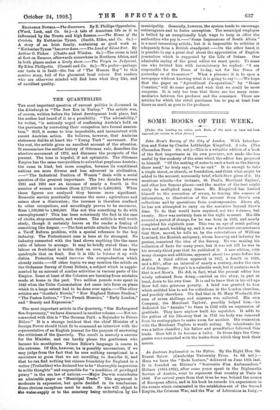SOME BOOKS OF THE WEEK.
[Under this heading we notice such Books of the weak as have not bean reserved for review in other forms.] John Stows Survey of the City of London. With Introduc- tion and Notes by Charles Lethbridge Kingsford. 2 vols. (The Clarendon Press. 305. net.)—This is a valuable edition of a book of the first importance in its own province, not made the loss useful by the modesty of the aims which the editor has proposed to himself. "Of the making of notes to such a book as the Survey there need," he truly says, "be no end." It is enough to take a single street, or church, or foundation, and think what might be added to the account, necessarily brief, which Stow gives of it. Ho mentions schools—for instance, St. Paul's, Merchant Taylors', and other less famous places—and the matter ot the text might easily be multiplied many times. Mr. Kingsford has limited himself to the correction of errors, to tracing the sources of information, to illustration of the account from Stows own collections and by quotations from contemporaries. Above all, he has not attempted to carry on the narrative beyond Stow's time. To do that would have required, not two volumes, but twenty. Stow was certainly born at the right moment. His life covered a period of change, for he was born in 1525, and nearly completed his eightieth year. This was an age of much pulling down and much building up, and it was a fortunate circumstance that Stow, moved, he tells us, by the exhortations of William Lombard, the Kentish antiquary, whose learning and industry he praises, conceived the idea of the Survey. Ito was making his collection of facts for many years, but it was not till he was in his seventy-third year that he published it. A now edition, with many changes and additions, appeared about two years before his death. A third edition appeared in 1617, a fourth in 1633, and a fifth, after an interval of nearly a century, under the care of John Strypo. Strype's is a valuable work, but it contains much that is not StKiw's. He did, in fact, what the present editor has wisely refrained from doing,—carried on the story, in part at least, down to his own time. It is sad to know that in his old age Stow fell into grievous poverty. A brief was granted to him which entitled him to ask for collections in the London churches, and possibly elsewhere. We find that in St. Mary Woolnoth the sum of seven shillings and sixpence was collected. His own Company, the Merchant Taylors', possibly helped him,—ho dedicated his "Annales " to them in 1592 with an expression of gratitude. They have anyhow built his sepulchre. It adds to the pathos of his life-story that in 1732 his body was removed from its resting-place to make room for another. His Connexion with the Merchant Taylors is worth noting. By inheritance he was a tallow chandler ; his father and grandfather followed this trade. Stow left it to become a tailor. In those days the Com- panies were connected with the trades from which they took their
names.














































 Previous page
Previous page